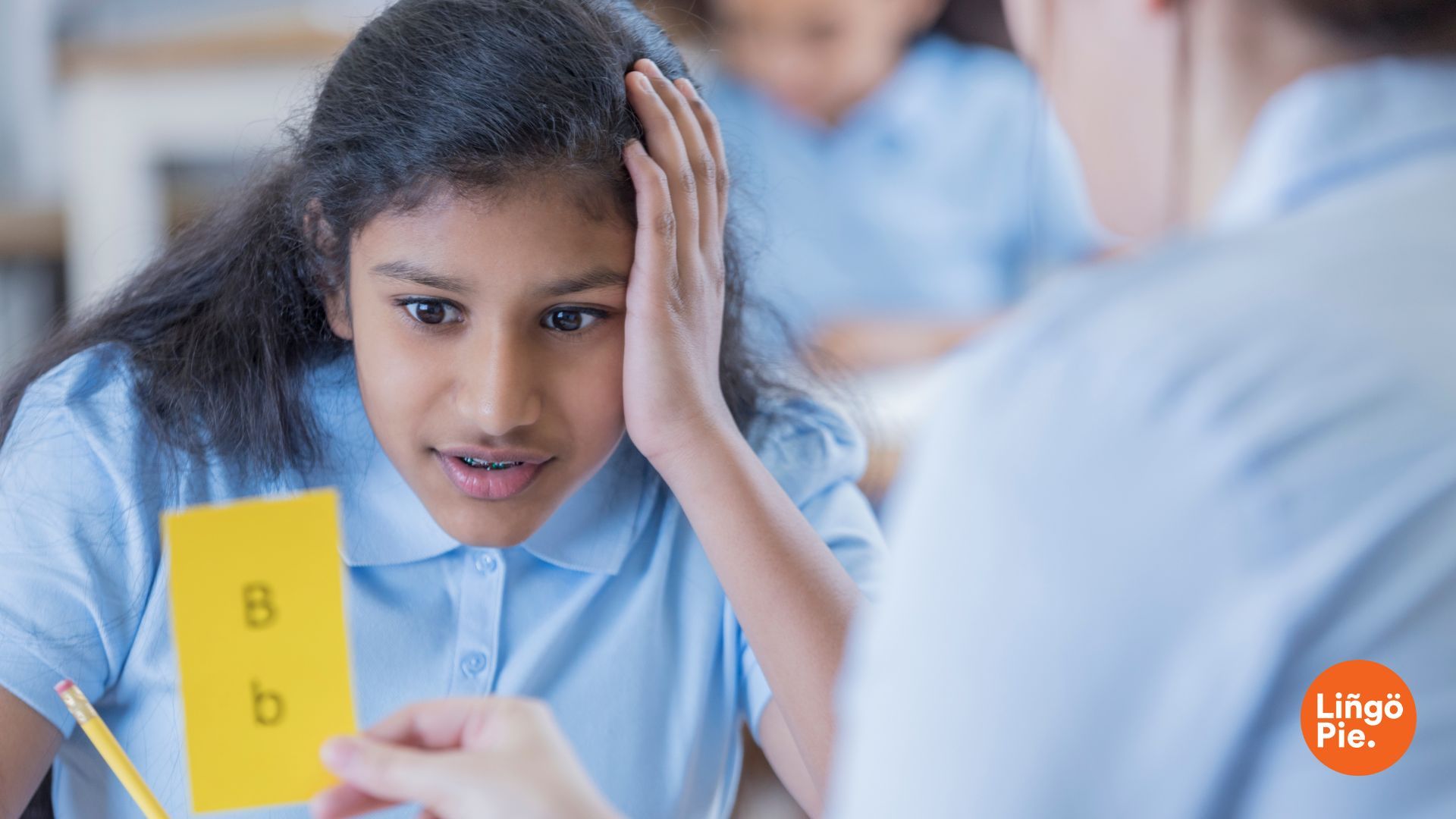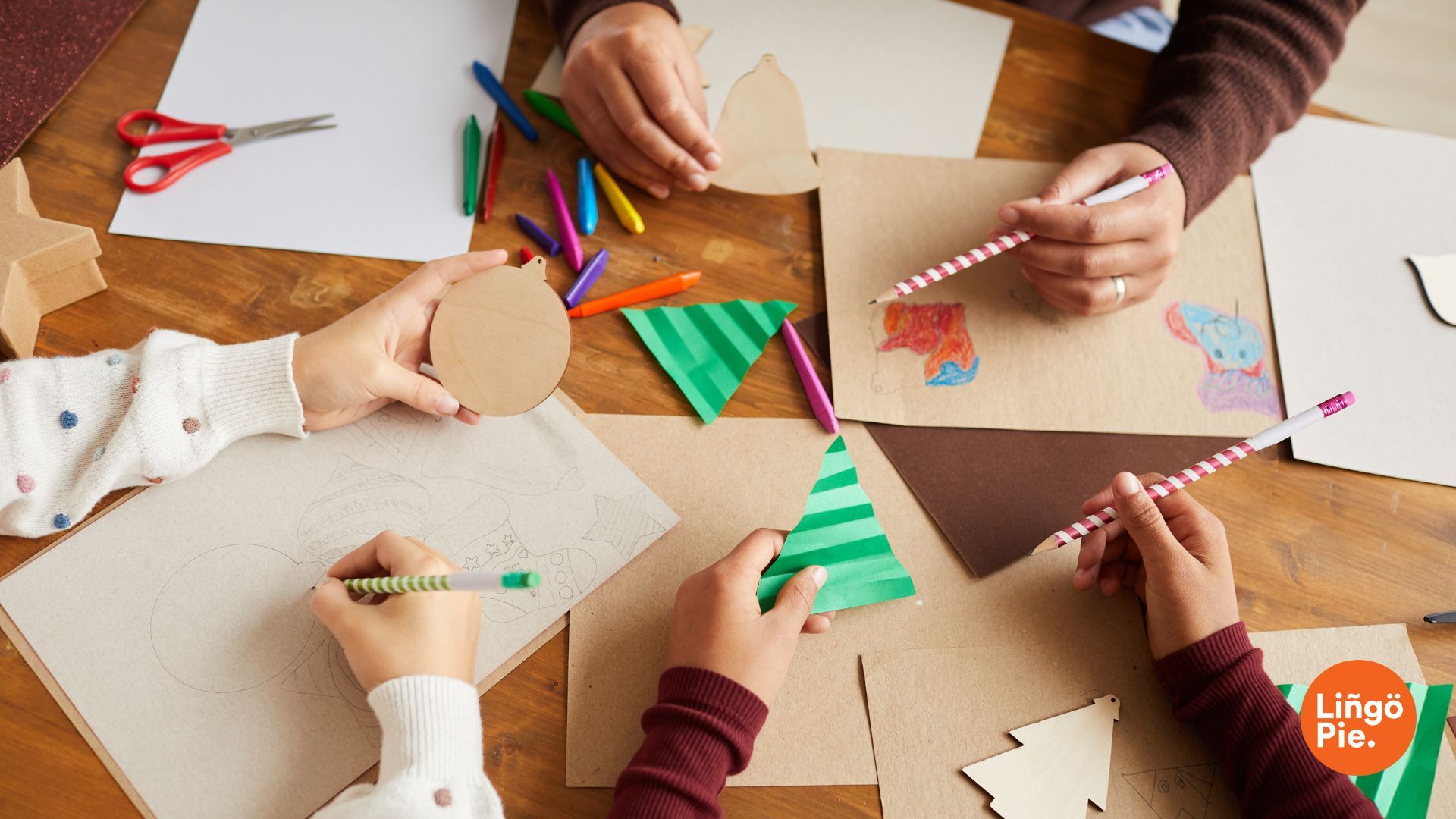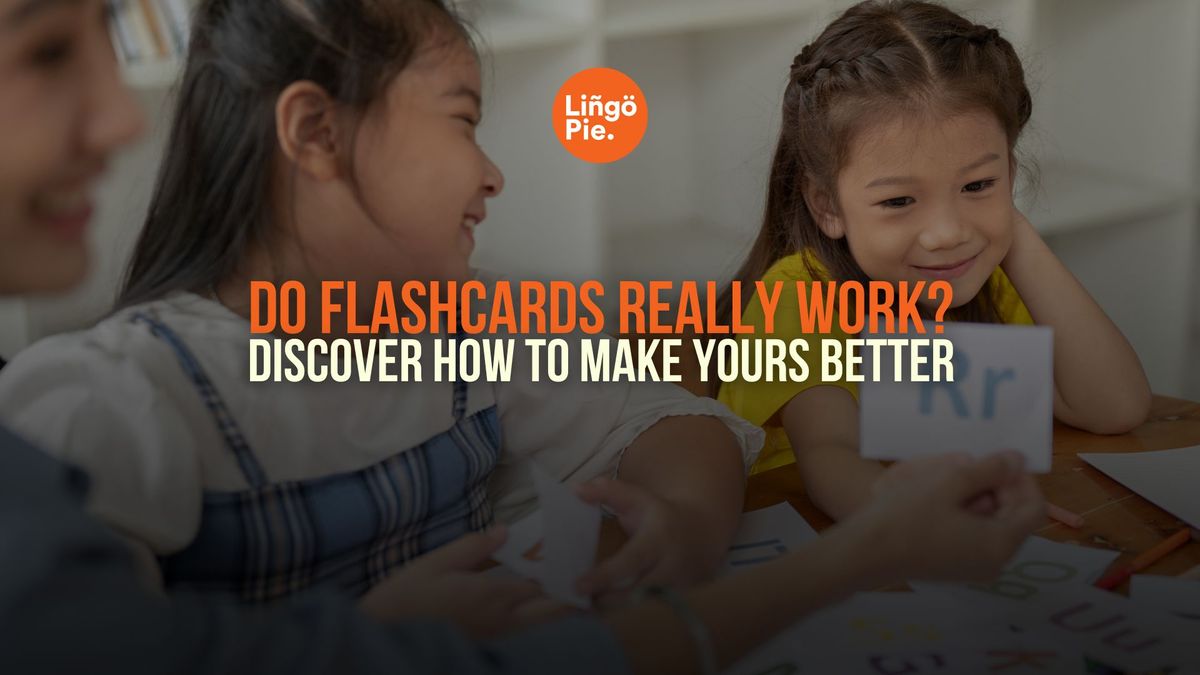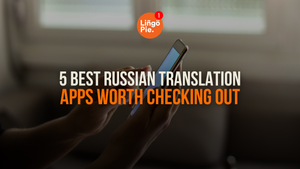Let's talk about flashcards for a minute. If you're learning a language, you've definitely tried them – and you've probably wondered if they're actually helping or just taking up space in your study routine.
It's a fair question. With all the amazing ways to learn languages these days, should we still be spending time flipping through flashcards?
Well, here's something interesting: researchers have found some pretty surprising things about how our brains learn better with flashcards. And it turns out there's more to these simple study tools than most people realize.
So before you let yours collect dust among all the other piles of pretty stationary, let’s take a closer look at how they work and how you can make them better.
- English or Spanish: 11 Surprising Differences
- How To Do The Mexican Accent [Complete 2025 Guide]
- How Many Countries Speak Spanish? You'll Be Surprised to Find Out!

Are Flashcards Effective For Studying?
Yes, flashcards are proven to be highly effective for learning – when used with the right techniques. Research consistently demonstrates that their impact on learning and retention is substantial, particularly in areas like language acquisition and vocabulary development.
The science behind flashcard effectiveness centers on two fundamental principles that drive successful learning: active recall and spaced repetition.
Flaschcards Force Your Brain to Remember
Active recall is what makes flashcards truly powerful. When you see a prompt and try to remember the answer, your brain has to work to retrieve that information. This mental effort strengthens memory connections far more effectively than passive reading. Research shows students who practice active recall retain up to 50% more information than those who simply review notes.
For example, when learning French verb conjugations, seeing "to go (they)" and struggling to recall "ils vont" builds stronger neural connections than repeatedly reading conjugation tables. Each attempt to recall actively rewires your brain to remember that pattern.
Flashcards Help You Review at the Right Time
Spaced repetition transforms flashcards from simple review tools into powerful learning accelerators. Instead of cramming all at once, reviewing cards at specific intervals helps move information into long-term memory. Studies demonstrate that learners using spaced repetition maintain 80% of learned material even months later.
For instance, instead of reviewing the adjective declension "der Hund" (the dog) ten times today and never again, you might review it once today, then tomorrow, then in three days. Each time you successfully recall it, the interval grows longer.

How To Study With Flashcards
Now that you understand why flashcards work, let's make sure you're getting the most out of them. Most learners make common mistakes that limit their progress – like cramming the night before or creating cards that are too complex. But with the right approach, you can transform flashcards into one of your most powerful learning tools.
Make Your Own Flashcards
Yes, we all love the convenience of pre-made flashcard sets for your second-favourite app, or even store-bought, laminated decks. However, there is a lot to be said for the old-school act of setting things to pen and paper. The process of identifying which words to use, plus writing down all these words in your brand-new piece of cardboard, will help kick-start the learning process.
Additionally, making your own flashcards when learning a language can help you connect vocabulary to your life as much as possible. If you're learning the word for "coffee shop," use the name of your favorite local café instead. This way, the personal connections make vocabulary stick better in your memory.
Add Pictures That Mean Something To You
Create a list of words you want to learn, then grab your phone and go on a "vocabulary hunt" around your neighborhood. Learning food vocabulary? Snap photos at your local market. Studying furniture terms? Take pictures around your home. These personal images will trigger stronger memories than generic stock photos ever could.
Not only does this make flashcard creation more fun, but you're also getting extra practice as you actively search for things that match your vocabulary list. Plus, every time you review that flashcard with your own photo, you'll remember the moment you took it – creating yet another memory hook for that word.

Create Themed Sets
Instead of making hundreds of random flashcards at once, break them into focused themes. This simple approach prevents overwhelm and keeps you motivated. You can start by grouping your cards into themes that match your daily life and interests.
A food lover? Create your first set around kitchen and restaurant vocabulary. A sports fan? Build a deck for game-day terms. Each themed set gives you focused, practical vocabulary you can use right away.
This method does more than just organize your cards - it changes how your brain processes new words. When you learn related words together (like everything you need to order at a restaurant), they become easier to remember and use in real conversations. As you master one theme, you'll feel confident and ready to tackle the next.
Expand After The Flip
After you flip each flashcard, don’t stop after reading the other side. After a while, your brain will disengage itself from the task and you won’t really be studying anymore.
Instead, say the word out loud and then use it in a sentence. For extra points, try to make that sentence a realistic one, or one that has some context. You can always borrow ideas from one of the characters from your favorite foreign TV show.
Don’t have a foreign TV show yet? Find some options here.
Mix Random Cards Together
Take cards from different themed sets and shuffle them together. This prevents your brain from relying on context clues and forces it to remember each word independently. When "coffee" appears right after "passport" instead of other café words, you're testing true recall.
Mix up both the themes and the sequence:
- Start with 10 cards from each theme
- Change the order every study session
- Combine different themes each time
- Keep track of which words trip you up
This randomization strengthens memory because your brain can't predict what's coming next. It's like training for real conversations, where you need to switch between topics naturally.
Use The Feynman Method
If you can't explain something simply, you don't understand it well enough. This insight from Nobel Prize winner Richard Feynman shows us exactly how to make better flashcards.
Test your cards by explaining them to someone who doesn't speak your target language. If they understand the concept, you've made an effective flashcard. If they look confused, simplify it further.

Simple Flashcard Games For Learning A Language
Turning flashcards into games isn't just about making study time more fun – it's about creating active learning experiences that stick. Games add challenge, competition, and immediate feedback to your practice sessions. They also help you think faster in your target language, preparing you for real conversations where quick recall matters.
The best part? These games work with any flashcard set you've created, whether they're focused on vocabulary, phrases, or grammar patterns. You can play them solo during your daily practice or turn them into social activities with other language learners.
Let's look at some proven games that transform basic flashcard review into engaging learning experiences.
Speed Categories
Players: 1-4 | Time: 10 minutes | Materials: 30+ flashcards from mixed themes
Quick, fun, and effective for building connections between words and training fast recall. This game turns your existing flashcard sets into an exciting challenge that mimics real conversation skills.
How to Play:
- Grab 30 random cards from your different themed sets
- Shuffle them and place them face-down in the center
- One player flips a card and starts a category (e.g., "Things in a Kitchen")
- Players take turns flipping cards, trying to add them to existing categories or starting new ones
- Must explain in target language why each card fits its category
- Cards that don't fit any category go to a discard pile
Why It Works: This game forces quick thinking in your target language while creating natural connections between words. When you have to explain why "coffee" fits in both "breakfast items" and "drinks," you're building the kind of flexible vocabulary use needed for real conversations.
Word Chain Challenge
Players: 1-6 | Time: 15 minutes | Materials: Vocabulary flashcards
Transform your flashcard review into a fast-paced word association game that builds vocabulary connections and quick thinking skills.
How to Play:
- Each player draws 7 cards from their flashcard deck
- First player places a card and makes a sentence using the word
- Next player must place a card that connects to the previous word (by meaning, category, or usage) and make a sentence
- Must explain the connection in your target language
- Can't repeat connections already used
If playing solo, draw 10 cards and challenge yourself to create a story using all words, with each word logically connecting to the next. Record yourself telling the story.
Why It Works: Creates natural word associations while practicing sentence formation. The pressure to find connections quickly mirrors real conversation demands, where you need to maintain flow while speaking.
The Translation Race
Players: 3+ | Time: 15 minutes | Materials: 20+ flashcards per player
A high-energy game that tests speed and accuracy while building instant translation skills.
How to Play:
- Players sit in a circle, each with their own flashcard deck
- First player draws a card and translates it out loud
- Immediately passes to next player who must translate their card
- Keep passing and translating faster
- Drop out if you take too long (5 seconds) or make a mistake
- Last player standing wins the round
Why It Works: Develops the quick translation skills needed for real conversations. The pressure of speed helps bypass the "mental translation" stage that slows down many language learners.
- 5 Easiest Asian Languages To Learn: Ranked
- 6 Popular Fictional Languages Every Cinephile Should Know
- High Valyrian 101: Targaryen Speech for House of the Dragon Fans
Learn Better With Lingopie
While making your own flashcards can be effective, there's a smarter way to learn. Lingopie's flashcard system takes the best of what we've discussed – active recall, spaced repetition, and themed learning – and adds powerful features you can't get with paper cards.
Why Lingopie Flashcards Work Better:
- Learn words in real context with video clips from native content
- Auto-generated cards from scenes you've watched
- Smart review scheduling based on your performance
- Access to authentic pronunciation from native speakers
Instead of spending time creating cards, focus on what matters most – actually learning the language. Lingopie handles the logistics while you enjoy the journey to fluency.
Start your learning journey today with Lingopie's intelligent flashcard system and experience the difference that context-rich, multimedia learning can make.
FAQs
Do flashcards actually help?
Yes, when used correctly. Research shows flashcards improve memory retention through active recall and spaced repetition. Studies indicate students using proper flashcard techniques retain up to 50% more information than those using passive study methods.
Are flashcards a good way to study in general?
Yes, flashcards are generally considered an effective study tool, not only for language learning but for a wide range of subjects. They promote active recall, aid in memorization, and can be customized to suit your specific study needs, making them a versatile and valuable method of study.
Are flashcards effective for language learning?
Yes, flashcards are an effective tool for language learning. They help improve memory, vocabulary retention, and active recall, making them a valuable asset in mastering a new language. When used correctly with effective strategies, flashcards can significantly enhance your language learning journey.
Does Lingopie use flashcards in its language learning approach?
Yes, Lingopie incorporates flashcards as part of its language learning method. These flashcards are created from the words and phrases you interact with while watching series and movies, enhancing your vocabulary acquisition.
How to use flash cards effectively?
The most effective way to use flashcards is to organize them into themed sets and review them consistently. Start by creating cards around related topics rather than random collections of information. Review your cards in both directions – seeing the word and recalling the definition, then seeing the definition and recalling the word.








![Is Lingopie Free? Plans, Pricing & Free Trial Guide [2026]](/blog/content/images/size/w300/2026/01/Is-Lingopie-Free.jpg)
![How To Gift Lingopie: One-Year vs Lifetime Subscription [GUIDE]](/blog/content/images/size/w300/2026/01/lingopie-gift-subscription.jpg)
![What is Lingopie? Complete Platform Guide [2026]](/blog/content/images/size/w300/2026/01/What-is-Lingopie.jpg)